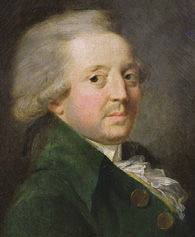42. Condorcet, Anti-superstitious Almanack, 1773-177469

For more than thirty years, from the first moment he encountered the members of the Academy of Sciences, the Encyclopédists, and the philosophes, to when he wrote, in secret, his unfinished Outlines of an Historical View of the Progress of the Human Mind, Condorcet (1743-1794) never stopped writing about how the accumulated moral knowledge and experience of the past could be used for the benefit of the future.70 Here he discusses the infamous Saint Bartholomew’s Day massacre of 1572, when Catholic soldiers slaughtered thousands of Protestants throughout France, and the more recent torture and execution of the twenty-year-old Chevalier de la Barre for sacrilege in 1766 (see p. 83). Condorcet addresses his future readers while also attacking his contemporaries.
It is now two hundred and one years since many thousands of citizens had their throats slit in the streets of the French capital, and since Admiral Coligny was assassinated in the name of God and King, he who first thought of turning France into a maritime power by founding colonies in the New World, and since the philosopher Ramus’s body was dragged through the gutters, his crime to have been engaged in a scholarly dispute about Latin pronunciation. The King of France kept himself entertained by taking potshots from the windows of his Louvre palace at any of his subjects who might be trying to escape across the river, just as certain German princes still like shooting at a herd of wild animals in what they term ceremonial hunts. The ladies of the court sallied forth with their lovers to inspect the corpses of the victims and added abomination to atrocity by cracking jokes over their dead bodies. The main towns of France copied these horrors. Orange and Toulouse led the way. Eighteen villages in the Valdo were put to the sword and burned down by the local magistrates in response to an order they’d received.
Two centuries have passed since those cruel events, but last century some dragoons sent to eradicate any remaining traces of the Protestant religion committed the same massacres all over again although this time the ministry termed them military executions. The soldier in charge, Baville, so unworthy of the family name Lamoignon to which nowadays Malesherbes71 brings so much honour, had just as many victims executed as those sacrificed by the Medici assassins, only he tortured them more cruelly, all within the official framework of the law and in the sacred name of justice. These murders were committed in the name of a prince who, in the rest of a reign lasting sixty years, had no other bloody act on his conscience. And this very century, under a government which is even less harsh, we have seen a young gentleman be condemned to be tortured, have his tongue cut out, his hand cut off and thrown into the fire. This by order of a handful of theology graduates who were convinced he was innocent and were as unconvinced as he by our empty superstitions but who had been accused by some priest or other of being atheists because of having the Jesuits expelled from France and so wanted to prove their Christian faith at the expense of the life and suffering of an innocent man. We have seen these same men punished for their arrogance and become the objects of sympathy on the part of the public, pitied by moronic flocks of courtiers, high society figures, and even philosophes and thinkers. Yet these men were monsters and they should have been crushed beneath the ruins of their disgusting tribunal. […]
How clear it is that neither the passing of two centuries nor the progress of the human mind in any way protect us against the recurrence of such persecution. Persecution is to be feared for as long as priests and clerics have the same way of thinking and for as long as they are in charge of the morals and opinions of their populations. Let us see whether this way of thinking is indeed Christian, and if it is, let us not expect any peace or happiness on earth until, with shedding of blood, we have eradicated this superstition, the most ridiculous and the most absurd of all those which have brought shame on the earth.
69 Nicolas de Condorcet, Almanach anti-superstitieux, ed. Anne-Marie Chouillet, Pierre Crépel, Henri Duranton, Université de Saint-Étienne: CNRS Éditions, 1992, pp. 109-110.
70 Portrait of Condorcet by Jean-Baptiste Greuze: https://commons.wikimedia.org/wiki/File:Nicolas_de_Condorcet.PNG
71 Guillaume-Chrétien de Lamoignon de Malesherbes (1721-94), known as Malesherbes, was a prominent lawyer and the government’s chief censor during the publication of Diderot and d’Alembert’s Encyclopédie. When it was banned in 1759, he alerted Diderot early, and hid all his papers in his own house, telling Diderot that it was the safest place for them. Without his protection, the Encyclopédie would probably never have been completed. He was guillotined during the Revolution.







